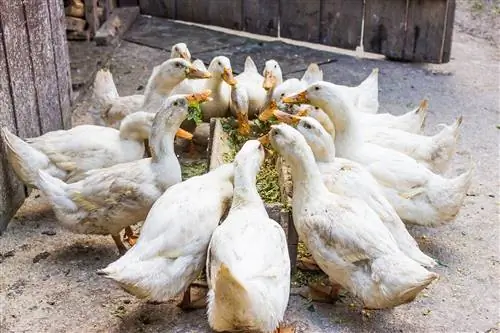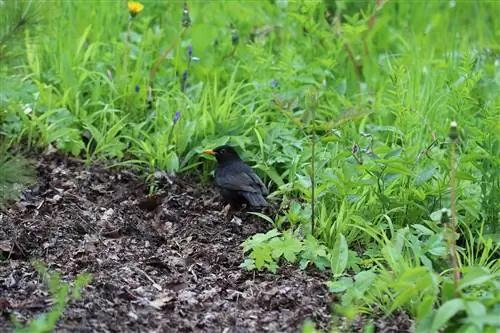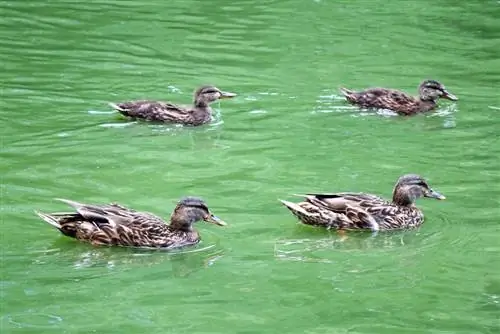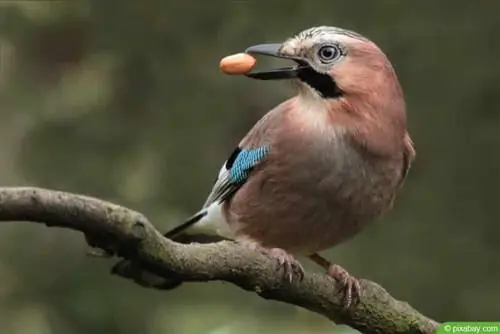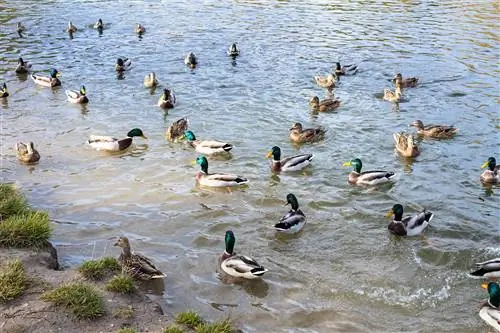- Author admin [email protected].
- Public 2023-12-17 03:39.
- Last modified 2025-01-24 12:45.
Keeping ducks in the garden is becoming increasingly popular as they are considered uncomplicated animals. If you want to keep farm animals, you have to know what is best to feed them. Read here what ducks can eat. This is what the ideal duck food looks like.
Basic feed
You can buy special duck food in stores, which mainly consists of various types of grain and oils. Occasionally dried vegetables or herbs are also included. You can also easily mix a suitable basic feed for ducks made from grain.
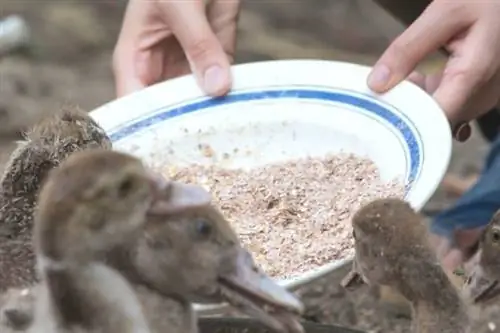
The grains should, however, be at least coarsely ground or crushed before they are fed. This will prevent the esophagus from becoming blocked and, in the worst case scenario, the animal from suffocating. In addition, the food should swell in water for a short time, which increases the volume beforehand and not only in the stomach, where it can lead to problems for the animals.
These grains are suitable as duck feed:
- Maize (exclusively ground)
- Wheat
- Oats
- Rye
Tip:
You can also feed small amounts of soy in winter. This provides the ducks with additional energy in the cold season.
Fruit and vegetables are also part of the basic food. You can feed it to the ducks fresh, cooked or dried and soaked again. The same applies here: always offer the animals portions that are suitable for their beaks. You should also remove the fruit peels if possible.
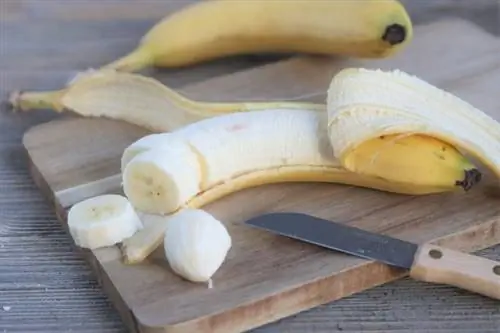
Due to the fructose content, you should only use fruits such as bananas in small quantities. Basically, all food for ducks must always be fresh. Never feed spoiled food scraps. Ducks are not gourmets, but spoiled food can cause stomach problems and even death.
You can feed leftover food such as trimmings, such as boiled potato peelings or carrot trimmings. The outer lettuce leaves, which are not particularly tasty for humans, are also suitable as duck food.
Stones in the stomach
Ducks have a special digestion and absorb small stones. These pass through the digestive tract and are excreted again. In captivity, intake is limited. This deficiency can be compensated for by offering poultry grit. It also has the advantage of containing calcium, which is good for bone structure and the robustness of the eggshells.
Additional food
The supplementary food is comparable to chocolate in humans and should only be fed in small quantities as an occasional treat.
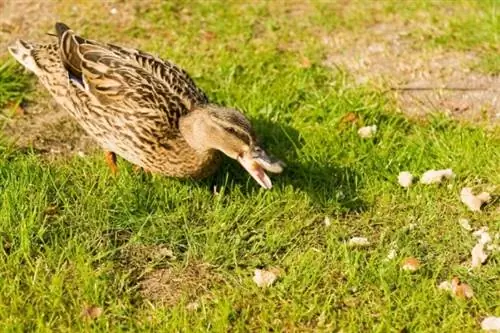
Ducks can only eat these foods in small doses:
- Bread (preservative-free if possible)
- Milk
- Sunflower seeds
- vegetable oils
Water
Water is essential when feeding. The ducks don't just need the water to drink. It helps them keep their food from getting stuck in their esophagus. In addition, it promotes natural food intake, as the ducks find their food in the water or in the bank area, among other places.
Suitable watering hole:
- Freshwater
- clean
- 5 to 10 cm deep
Due to the fact that ducks switch between solid and liquid food, water bowls quickly become dirty. A pond with fresh water is therefore part of species-appropriate husbandry. This means there is no need for additional fresh water, but the feeding area should be close to the pond.
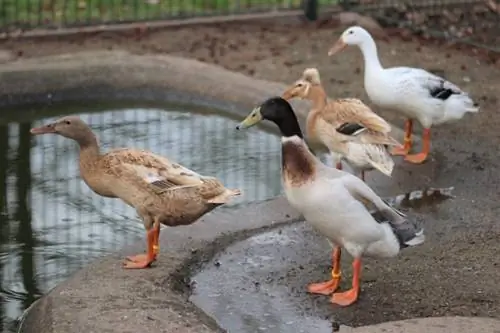
Note:
The runner ducks, which are often kept, get by with a small bathing area. A pond is also needed for this breed to ensure species-appropriate husbandry.
Natural food sources
Many aspiring duck keepers are under the mistaken belief that the ducks will find enough food in the garden or meadow. However, the energy consumption of active ducks such as running ducks is very high and they cannot meet their requirements from natural food sources alone. They are omnivores and also eat animal food. This is what ducks eat, among other things:
- Insects
- invertebrates
- Arachnids
- small fish in natural waters
- Amphibians
Contrary to popular belief, snails, especially large snails like the Spanish slug, are not among the preferred animal proteins. Since the mucus of these snail species is rather sticky, they literally get stuck in the ducks' throats. However, ducks eat the clutches of snails.
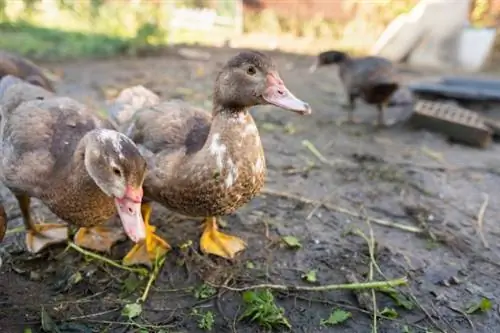
Tip:
The ducks find a lot of aquatic plants and grasses in nature for plant food. If ducks are looking for food in the garden, you should protect the vegetables, because they won't stop at a head of lettuce.
How often feed?
How often ducks need to eat can vary from breed to breed. Always provide enough food, but not so much that the bowl is largely full even after feeding. To find the optimal amount of food, you should offer the ducks smaller portions several times a day.
It is important when feeding that the feeding place is always clean. You need to clean feeding bowls regularly so that they do not become a source of disease. You should also make sure that no wild birds have access to the food, as they can also transmit diseases. Rats at the feeding place are also a pest and potential carrier of diseases. It makes more sense not to just leave the food bowls standing, but to offer the food to the ducks again and again.
Tip:
There are duck feeders that only the ducks have access to because it can only be opened using a special mechanism. If you want to use such dispensers, train the ducks to use them early on.
Frequently asked questions
What can ducks not eat?
The duck menu does not include meat, pasta or pastries that are heavily seasoned or s alted. Sugary foods are also not suitable for ducks.
What do ducklings eat?
Ducklings do not require any special food. They basically eat the same food as adult ducks. For chicks, the food only needs to be provided in a more chopped form. Grain should be ground finely so that pieces that are too large do not pose a danger.
Is it good to feed ducks?
Yes, as long as you offer the ducks suitable food. Compared to wild ducks, ducks kept as livestock have higher energy consumption. They therefore always rely on additional feeding.

